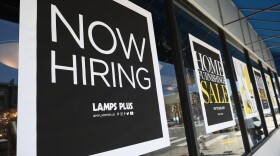
Scott Horsley
Scott Horsley is NPR's Chief Economics Correspondent. He reports on ups and downs in the national economy as well as fault lines between booming and busting communities.
Horsley spent a decade on the White House beat, covering both the Trump and Obama administrations. Before that, he was a San Diego-based business reporter for NPR, covering fast food, gasoline prices, and the California electricity crunch of 2000. He also reported from the Pentagon during the early phases of the wars in Iraq and Afghanistan.
Before joining NPR in 2001, Horsley worked for NPR Member stations in San Diego and Tampa, as well as commercial radio stations in Boston and Concord, New Hampshire. Horsley began his professional career as a production assistant for NPR's Morning Edition.
Horsley earned a bachelor's degree from Harvard University and an MBA from San Diego State University. He lives in Washington, D.C.
-
The IRS is cutting more than 6,000 jobs this week, as part of the Trump administration's downsizing of the overall federal workforce. That includes approximately 100 employees at the agency's Kansas City offices, according to the local union.
-
There is one economic riddle ahead of Super Bowl Sunday: The egg market has been hit hard by avian flu, but wings are abundant and relatively affordable this year. So what gives?
-
Republican governors are moving to end $300-a-week pandemic payments for the unemployed in a controversial effort to push people back to work. Missouri is set to end them this week.
-
Millions of jobs have been lost as businesses keep their doors closed to slow the spread of the coronavirus. Working women have been hit hardest, accounting for nearly 60% of the early job cuts.
-
In its latest salvo, the Federal Reserve announced $2.3 trillion in new lending programs in an effort to keep businesses and local governments afloat during the coronavirus pandemic.
-
The Federal Reserve has moved quickly and creatively to pump money into the rapidly shrinking U.S. economy in hopes of keeping it afloat long enough to outlast the coronavirus pandemic.
-
For the first time in nearly a decade, the economy suffered a net loss of jobs as the coronavirus began to take hold in the country. The unemployment rate shot up to 4.4%.
-
The coronavirus pandemic is taking a toll on the nation's factories. Manufacturing activity slumped in March as the virus cut into both supply and demand.
-
New orders, production and employment were all down.These are just some of the ways the coronavirus pandemic and the government's effort to address it are slamming the brakes on the U.S. economy.
-
As efforts to slow the coronavirus pandemic temporarily put millions of Americans out of work, forecasters are predicting a record slowdown in the U.S. economy.









